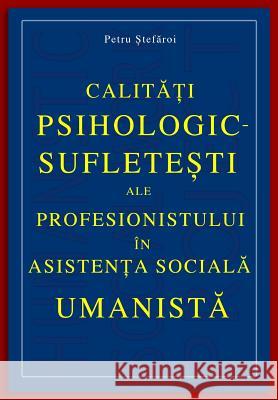Calitati Psihologic-Sufletesti Ale Profesionistului in Asistenta Sociala Umanista » książka
Calitati Psihologic-Sufletesti Ale Profesionistului in Asistenta Sociala Umanista
ISBN-13: 9781494372767 / Rumuński / Miękka / 2013 / 380 str.
This book, "Psycho-Spiritual/Soulful Qualities of the Professional in Humanistic Social Work," is part of the HUMANISTIC SOCIAL WORK Project, which promote Humanistic Social Work as THE THIRD WAY in theory and practice. At a first glance, social work, as theory, is dominated by two, relatively opposed, major ways, forces, orientations, paradigms, namely Traditional/Conventional Social Work and Critical/Radical Social Work. But, major social, political and economic events have strongly shaken the ontological and ideological foundation of Traditional Social Work (economic crisis), and of Critical Social Work (anti-communist revolutions). Such, has been greatly affected the policies /practices of helping the vulnerable groups, individuals, people in need through welfare state mechanisms and social solidarity, within the capitalist society, promoted by Traditional Social Work, and the projects of some radical structural changes, the aspirations to build a better society, without oppression, social injustice, inequality, discrimination and poverty, especially through social and political reforms and progress, promoted by Critical Social Work. In this context, another orientation, in a subtle manner, gradually, seems to advance, with increasing force. It's about the Humanistic Orientation and its logical expression: Humanistic Social Work - syntagma, philosophy, theory and methodology which are in process of establishing, and remains to be seen whether it will get to sit alongside Traditional Social Work and Radical Social Work, alongside their theories and methods, and especially if it will imposes, in a coherent way, in the current practice of the professionals and agencies. * (English-language readers may find in the book a sufficiently elaborated presentation of the humanistic social work theory and methodology, in the section - from Appendix - with the title: HUMANISTIC SOCIAL WORK: THE THIRD WAY IN SOCIAL WORK THEORY AND PRACTICE - pp. 338-361) * Primul capitol al lucrarii - ASISTENTA SOCIALA UMANISTA - A TREIA CALE IN TEORIA SI PRACTICA ASISTENTEI SOCIALE - este consacrat prezentarii conceptului, doctrinei si specificului asistentei sociale umaniste, cu accent pe principalele sale surse, valori, teorii, practici si metode. Capitolul al doilea - PERSONALITATEA UMANA - SFERA/DIMENSIUNEA ONTOLOGIC-SPIRITUALA - prezinta ceea ce s-ar putea numi sursele psihologic-ontologice ale calitatilor sufletesti ale profesionistului, in principal sufletul afectiv/social si sufletul spiritual (mistic, ludic, estetic, moral, intelectual). In capitolul al treilea - PERSONALITATEA UMANA SI CALITATILE PSIHOLOGIC-SUFLETESTI ALE PROFESIONISTULUI IN ASISTENTA SOCIALA UMANISTA - se ajunge efectiv la continutul tematicii propusa de titlul cartii, abordandu-se tema calitatilor psihologic-sufletesti ale profesionistului pornindu-se de la categoria de personalitate UMANA a profesionistului, si insistandu-se pe necesitatea definirii acesteia in raport de modul umanist-spiritual de reprezentare a clientului. In capitolul al patrulea - CALITATI PSIHOLOGIC-SUFLETESTI SI CONDUITE ALE PROFESIONISTILOR IN "SISTEMUL" ASISTENTEI SOCIALE UMANISTE - se incearca o prezentare a calitatilor psihologic-sufletesti ale asistentului social, psihologului, profesionistului din cadrul personalului de ingrijire, educatie, terapii de recuperare, ale asistentului maternal profesionist, angajatului din aparatul de conducere, functionaresc si de deservire, ale voluntarului, lucratorului din organizatii neguvernamentale, umanitare. Capitolul al cincilea - ASISTENTA SOCIALA UMANISTA A COPILULUI SI FAMILIEI. CALITATI PSIHOLOGIC-SUFLETESTI SI CONDUITE ALE PROFESIONISTILOR - are rolul de a operationaliza majoritatea tezelor teoriei si metodologiei asistentei sociale umaniste, afirmate in lucrare, cu focalizare pe calitatile psihologic-sufletesti ale profesionistului necesare cu precadere practicienilor care se afla in contact direct prelungit cu copilul si/sau familia.
Zawartość książki może nie spełniać oczekiwań – reklamacje nie obejmują treści, która mogła nie być redakcyjnie ani merytorycznie opracowana.











